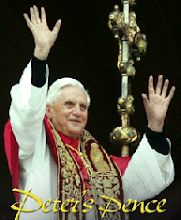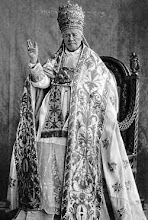By Damian Thompson Last updated: February 18th, 2010
Taken from the Telegraph
Here’s my op-ed article on the Anglican ordinariates from this week’s Catholic Herald:
On Monday, Anglo-Catholics across England will be holding a day of prayer to help their bishops, clergy and laity decide how to respond to the Pope’s provision of a self-governing Ordinariate for former Anglicans. Many members of our Church will be praying with them; in Oxford, Anglicans are joining the members of the Oratory for a Holy Hour in front of the Blessed Sacrament.
There is a lot to pray about, and a lot to pray for. Anglo-Catholics interested in the Holy Father’s offer will be praying for gifts of discernment not only for themselves but for their fellow Anglican Catholics and Catholic Anglicans. (The two terms are not quite interchangeable, which gives you some idea of the complexity of the situation.)
But I’m guessing that top of the list of requests to the Almighty will be for the Catholic Church, in consultation with the Anglo-Catholic leaders, to get it right. That is, to offer a carefully designed model for the Ordinariate, together with detailed instructions for constructing it. And they will have to be detailed, because people will be joining what is, in effect, a non-territorial diocese from different starting points, bringing with them different aspects of the Anglican “patrimony”, and – at least initially – different expectations.
In his address to the English and Welsh bishops earlier this month, Pope Benedict urged them to be generous in their implementation of Anglicanorum coetibus, the Apostolic Constitution that will create Ordinariates worldwide as a permanent provision for ex-Anglicans. Why did he single out this subject? One rumour is that the Congregation for the Doctrine of the Faith is puzzled by the small numbers of members of the Church of England planning to join the Ordinariate, and are worried that elements in the Bishops’ Conference are pouring cold water on the project.
As it happens, there are prominent Catholics talking down the Ordinariate scheme, and they should be ashamed of themselves; but they certainly do not include Archbishop Bernard Longley, Bishop Malcolm McMahon and Bishop Alan Hopes, the three bishops on the Commission working out the details of the English scheme. This seems to me to be an ideal trio of English bishops for the task, combining holiness, humour, intellect and, in the case of Bishop Hopes, the specialist knowledge that comes from having once been a leading Anglo-Catholic.
No: what is slowing things down is the fact that a divided, demoralised and confused Anglo-Catholic constituency is under pressure to make decisions about an offer that is not yet on the table. How could it be, when so much hangs on the attitude and decisions of the Church of England?
The General Synod will not outline its legislation for women bishops until its July meeting. So far as I can work out, there is a slim chance that the Synod may give traditionalists limited oversight by bishops who do not ordain women. This would be no more than a fig leaf, and it is probably not going to be offered anyway, so how can Forward in Faith, the main Anglo-Catholic body, justify delaying its official response to Anglicanorum coetibus until the Synod is over? The Apostolic Constitution, remember, was drawn up following requests from traditionalist Anglican bishops for pastoral oversight; it was not intended as a last resort.
In the end, however, the Catholic Church has to face the fact that, in England more than any other country, history has bequeathed us an almighty ecclesiastical mess. Anglo-Catholicism is part of the established religion of England; it is here that a movement of clergy and their patrons adopted a Catholic (sometimes ultra-Catholic) style of worship that developed in opposition to the Church of England hierarchy, and has always been embraced more readily by priests than by lay people. Not only are there fearsome legal barriers to vicars “taking their parishes with them” – the congregation does not own the building, as it does in other countries – but the men and women in the pew are often less diehard in their opposition to women priests and bishops than their pastors. Or, to put it another way, their objections are cultural rather than theological.
My impression is that the Ordinariate appeals most to the Anglican bishops who proposed it and to young, conservative Anglican clergy and seminarians. Older incumbents are split between those few who will move soon, with whoever follows them; those who never wanted to be “Roman Catholics” and will either stay put or move into a dissident Anglican sect or Orthodoxy; and a very large group who favour the Ordinariate in principle but will stay in the C of E for as long as it takes to persuade significant numbers of their flock that this is their only opportunity to carry on worshipping as Catholics (which is what they consider themselves to be). That will take time; the reality of women bishops will have to sink in. The Catholic Church must not be too dismissive of Anglo-Catholic priests who stay to argue gently the case for the Ordinariate, as opposed to staying to fight the lost cause of classic Anglo-Catholicism. Anglicanorum coetibus has no expiry date; some of its finest fruits may not be visible for a decade, when traditionalist laity overcome their natural fear and plunge into the Tiber.
For that to happen, it is essential that the first groups of Anglicans who enter the Ordinariate do flourish, on however small a scale. There have been predictions that around 20 parishes will leave the Church of England soon; I take those with a pinch of salt, so enormous are the legal and pastoral obstacles for a single parish to detach itself corporately from the Established Church. It may be that the first English Ordinariate structure incorporates merged parishes using borrowed church buildings; that will not be a disappointing outcome so much as a realistic one.
In a sense, we should be glad that this experiment, unprecedented in English history, will be pioneered on a small scale. If the Church gets this right, I am confident that the Ordinariate will not stay small for long. The Catholic Church in England and Wales is crying out for new talent, for a true “diversity” rooted in an English devotion that pre-dates the Reformation. But that discussion must wait for another day.
Subscribe to:
Post Comments (Atom)




































No comments:
Post a Comment